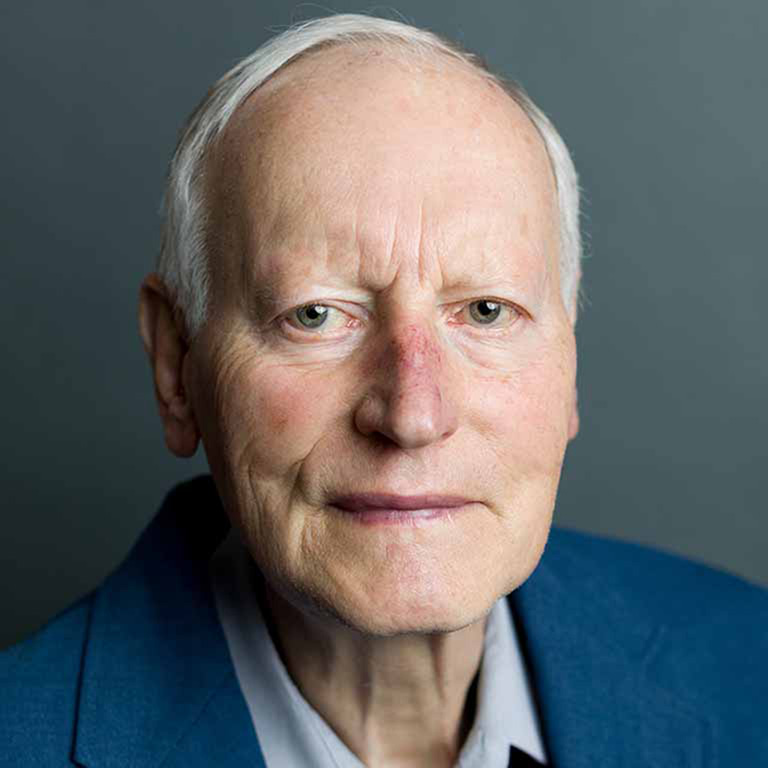By Willard E. Witte, Associate Professor Emeritus, Department of Economics, Indiana University
George von Furstenberg arrived in Bloomington in 1973 and retired in 2006. For most of that period he was the department’s central pillar in macroeconomics. For all those thirty-three years he was a role model as a scholar, teacher, mentor, and colleague.
George was born in 1941 into an upper-class German family whose position was maintained after World War II. As fitted his social position, from 1955-1958, his early education was at The Oratory School, a Roman Catholic boarding school for boys located in Southern England. George was, however, the fifth son in his family, and he decided that his prospects for individual success in Germany would be limited. Instead, at age 19, he chose to emigrate to the United States, a decision that led to a period of estrangement from his family.
He arrived in this country essentially penniless. Undaunted he went to work (for a time on the docks of New York City), while taking college coursework initially in night classes at City College of New York (where there was no tuition), but then at Columbia University graduating magna cum laude in 1963. This led to a fellowship for graduate study at Princeton culminating with a 1967 Ph.D. in Economics.
During the next decade and a half George moved back and forth between positions in academics and government, beginning in the former realm with an assistant professor position at Cornell. In 1971 he arrived at IU as an associate professor, with promotion to full professor following in 1973. He then shifted to the public sector with a stint as Senior Staff Economist at the President’s Council of Economic Advisers, following which he returned to IU. In 1978 he began five years at the International Monetary Fund as Chief of the Financial Studies Division. The length of this appointment required George to resign from IU. But in 1983 he was rehired, this time as a Rudy Professor. Department Chair Mike Klein announced his return with a Churchillian “George is back” email to the department. He remained on our faculty until his retirement in 2006, with a two-year absence from 2000-2002 when he was at Fordham.
George was a prolific scholar producing a continuous stream of publications stretching from the late 1960s into the second decade of this century. His early work focused on topics related to mortgage finance markets, but by the time he first arrived at IU had shifted to a broader (and more important) concern with the interaction of corporate and government finance with the overall macroeconomy. Then, circa 1990 and for the rest of his career his work shifted mostly to various aspects of international finance. Much of his later work was joint with colleagues and graduate students at IU.
I arrived at IU while George was on his hiatus at the IMF. When he returned, and for most of the following decade we shared the teaching of the graduate core sequence in macroeconomics. It was a good partnership that produced a considerable number of students who have gone on to excellent careers related to macro in academics, government, and the financial sector.
During this same period, we also did most of the department’s recruiting in macro. This meant sitting in hotel rooms at the annual post-Christmas convention of the American Economic Association interviewing long strings of potential hires. George was not one to suffer fools gladly, which could make for some uncomfortable moments. But there were also high points. Probably the best was in 1985 when the convention was in New York. Our list of candidates included a student completing his Ph.D. at Washington State University, not a program that we would normally recruit from. But his thesis advisor was a very competent economist, so we gave him a look and then a job offer, which he accepted. His name was Christopher Waller. He remained at IU for 13 years, then moved to chaired positions at Kentucky and Notre Dame, and finally to the Federal Reserve where he is now on the hot seat as a member of the Board of Governors.
Throughout his career George served as an important role model for all around him – both within and beyond the department. At his retirement reception in 2006 Moya Andrews, then Dean of Faculties, related that earlier in her career George had taught her how to efficiently conduct a meeting. He understood the importance of rules and procedure. In 1999 he and I collaborated on a complete revision of the department’s by laws.
On a more personal level, for a couple of years we regularly played tennis. The first time we played I expected that he would have a traditional game with solid ground strokes and perhaps a serve and volley aspect. That seemed to somehow fit his tall, slender build. Instead, he hit nearly every shot with a variety of spins, often slice, which I found totally perplexing. It was also very effective, and he won most of our matches.
George never lost his patrician upbring. He knew (and exercised) aspects of proper grammar that I didn’t even know existed. By the time I met him, his relationship with his family had been repaired, and most summers he spent time at the family estate in Germany. On one occasion, while he was there, I had a need to talk with him (I don’t remember why) and gave him a call at mid-morning German time. I got through to Gabrielle, his wife, and learned that George was hunting, which meant going to a shooting location toward which staff would drive game.
George was a gentleman who had unfailingly good manners. I don’t ever recall seeing him visibly angry. His love for Gabrielle was deep. Her slow decline during the period before her death in 2019 took a visible toll on George.
Bringing George back to IU was perhaps the best hiring decision by the department during my time here. His passing is a great loss to our profession and to me personally.


 The College of Arts
The College of Arts